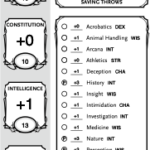You Are More than Your Stat Block (Critical Success)

The recent release of Tasha’s Cauldron of Everything has generated significant controversy in the D&D community, most notably for the Custom Origin option, which gives players much more flexibility in the character creation process. Some raise concerns that this will allow players to min/max, optimizing their characters to be more powerful than other characters of the same level. Others counter that this allows for more roleplay options, expanding characters beyond their archetypes. Still others have argued that it’s a moot point, that a character is so much more than the sum or distribution of its stats.
But how often do we make the same mistake in real life? How often do we reduce others or ourselves to who’s strongest, smartest, or most charismatic? Isn’t that the essence of a clique: jocks, nerds, or the popular crowd? Of course, there’s more to it than that — in my high school, to be in the popular crowd, you had to be able to afford the right brands of shoes and polo shirts (It was the 80’s.) in addition to being adept with social queues.
Adults are more subtle in our approach to others, but we still evaluate people based essentially on numeric criteria, replacing wizards and rogues with executives and unskilled laborers, making class as clearly defined as in D&D, except Tasha now allows players to change their class — would that this were so easy in real life.
This becomes particularly toxic when we reduce ourselves to our stat blocks. It’s easy to think of ourselves as undesirable due to what we perceive as some bad dice rolls at our creation. Who could ever love someone with such glaring dump stats? And if you believe yourself unlovable, you will have difficulty receiving love, not trusting those who purport to love you.
Thus the Critical Advantage style of game mastering focuses on the value of each character (and more importantly, each player) regardless what numbers appear on their stat block, whether real numbers on a page or evaluations of real people. We emphasize that a character (or player) is valuable because they are loved, and if love is unconditional, then a person being lovable has nothing to do with evaluation. You are lovable because I choose to love you. Nothing you do or even think about yourself can change my decision to love you. You can’t convince me not to. You can’t prove yourself unlovable, because “lovable” is determined outside of you.
As a Christian, I take that farther. I love you, because God has declared you to be unconditionally lovable. No matter what anyone else chooses to determine about you, God Himself has assigned you the labels “lovable” and “Mine,” so when anyone else says otherwise, regardless of their criteria, they’re just wrong.
You are more than your stat block. Your defining stat is
LOVABLE: ∞
The rest is just flavor.